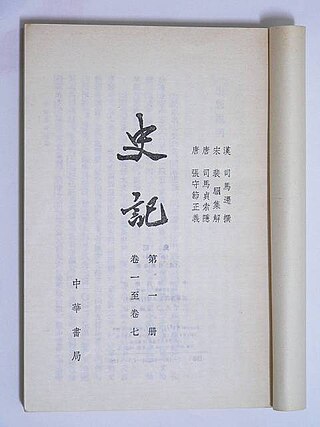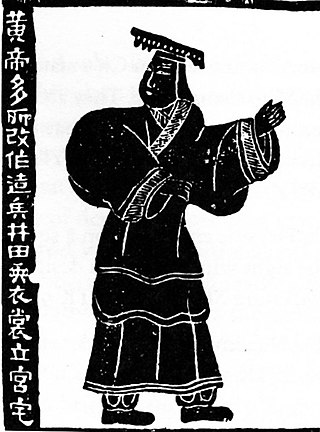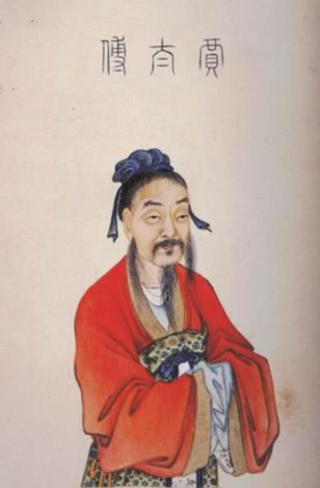Related Research Articles

Qin Shi Huang was the founder of the Qin dynasty and the first emperor of China. Rather than maintain the title of "king" borne by the previous Shang and Zhou rulers, he assumed the invented title of "emperor", which would see continuous use by monarchs in China for the next two millennia.

Records of the Grand Historian, also known by its Chinese name Shiji, is a monumental history of China that is the first of China's Twenty-Four Histories. The Records were written in the late 2nd century BC to early 1st century BC by the historian Sima Qian, whose father Sima Tan had begun it several decades earlier. The work covers a 2,500-year period from the age of the legendary Yellow Emperor to the reign of Emperor Wu of Han in the author's own time, and describes the world as it was known to the Chinese of the Western Han dynasty.
Sima is a Chinese family name. It is one of the rare two-character Chinese family names; most Chinese family names consist of only a single character. It is an occupational surname, literally meaning "control" (sī) "horses" (mǎ), or "horse officer". The family name originated from one of the offices of the Zhou dynasty.
Feizi, also known as Qin Ying and Ying Feizi, was the founder of the Qin state.

The Yellow Emperor, also known as the Yellow Thearch or by his Chinese name Huangdi, is a mythical Chinese sovereign and culture hero included among the legendary Three Sovereigns and Five Emperors, and an individual deity (shen) or part of the Five Regions Highest Deities in Chinese folk religion. Calculated by Jesuit missionaries, who based their work on various Chinese chronicles, and later accepted by the twentieth-century promoters of a universal calendar starting with the Yellow Emperor, Huangdi's traditional reign dates are 2697–2597 or 2698–2598 BC.
Ziying, King of Qin was the third and last ruler of the Qin dynasty. He ruled over a fragmented Qin Empire for 46 days, from mid-October to early December 207 BC. He is referred to in some sources with the posthumous name Emperor Shang of Qin (秦殤帝) although Qin abolished the practice of posthumous names.

Jia Yi was a Chinese essayist, poet and politician of the Western Han dynasty, best known as one of the earliest known writers of fu rhapsody and for his essay "Disquisition Finding Fault with Qin", which criticises the Qin dynasty and describes Jia's opinions on the reasons for its collapse. In particular, he is famous for his two fu, On the Owl (鵩鳥賦) and his Lament for Qu Yuan (吊屈原賦). He is also the author of the treatise Xinshu (新書), containing political and educational insights.

Xiong is the pinyin romanization of the Chinese surname 熊 (Xióng). It is 41st in the Hundred Family Surnames, contained in the verse 熊紀舒屈.

Li County or Lixian is an administrative division of the prefecture-level city of Longnan in southeastern Gansu, a northwestern province of China. The 2010 Chinese census found a population of 458,237, a decline of around 25,000 from the year 2000 but still placing it second in size within its prefecture.
Chunwei is a name associated with the Xiongnu, a tribal confederation of nomadic peoples who, according to ancient Chinese sources, inhabited the eastern Eurasian Steppe from the 3rd century BC to the late 1st century AD.
The Marquis of Qin was the second ruler of the Qin state, founded when his father Feizi was granted a small fief at Qin by King Xiao of Zhou. The Marquis of Qin succeeded his father, who died in 858 BC, and ruled for 10 years. He died in 848 BC and was succeeded by his son Gongbo. His ancestral name was Ying, but his given name is not known.
Gongbo, personal name unknown, was the third ruler of the Qin state. Gongbo succeeded his father, the Marquis of Qin, who died in 848 BC, and ruled for three years. He died in 845 BC and was succeeded by his son Qin Zhong.
Yi was a tribal leader of Longshan culture and a culture hero in Chinese mythology who helped Shun and Yu the Great control the Great Flood; he served afterwards as a government minister and a successor as ruler of the empire. Yi is also credited with the invention of digging wells. He was the ancestor of the ruling houses of the Zhao, Qin, Xu and Liang states.
Duke Wen of Qin, personal name unknown, was a duke of the Qin state.
Duke Xian of Qin, personal name unknown, was from 715 to 704 BC the monarch of the Qin state. His posthumous name was recorded as Duke Ning of Qin (秦寧公) in the Records of the Grand Historian by Western Han historian Sima Qian, but inscriptions on excavated bronzes from the era have proven that "Ning" (寧) was a miscopy of the correct character "Xian" (憲).
Zhao Ji, personal name unknown, was the wife of King Zhuangxiang of Qin and the mother of Qin Shi Huang, the first emperor of China. Upon her marriage, she was the Lady Zhao; after the king's death, she was the Queen Dowager.
Lady Xiu, formerly romanized as Lady Hsiu, is a figure in Chinese mythology.
Zhongjue --, formerly romanized as Chung Chüeh -- was a figure in the legendary prehistory of China.
Xuxuan, formerly romanized as Hsü-hsüan, was a legendary figure of Chinese history. He was a descendant of Bo Yi according to traditional accounts.
Guan Ying, posthumously known as Marquis Yi of Yingyin, was a Chinese military general and politician who served as a chancellor of the Western Han dynasty.
References
- 1 2 3 4 5 6 Sima Qian. Records of the Grand Historian translated by Nienhauser, William Jr. The Grand Scribe's Records: The Basic Annals of Pre-Han China, pp. 87 ff. Indiana University Press, 1994. Accessed 4 December 2013.
- ↑ Lao Kan. Shih Chih Chin-chu, p. 106. (in Chinese)
- ↑ Sima Qian. Records of the Grand Historian , 《秦本纪第五》 ["The Qin Chronicles, Part Five"]. Guoxie, 2003. Accessed 7 Dec 2013. (in Chinese)
- ↑ Han Zhaoqi. Annotated Shiji, "Annals of Qin", pp. 353–359. Zhonghua Book Company, 2010. ISBN 978-7-101-07272-3. (in Chinese)
- ↑ Yap, Joseph. Wars with the Xiongnu: A Translation from Zhizhi Tongjian, p. 51. AuthorHouse, 2009. Accessed 8 Dec 2013.